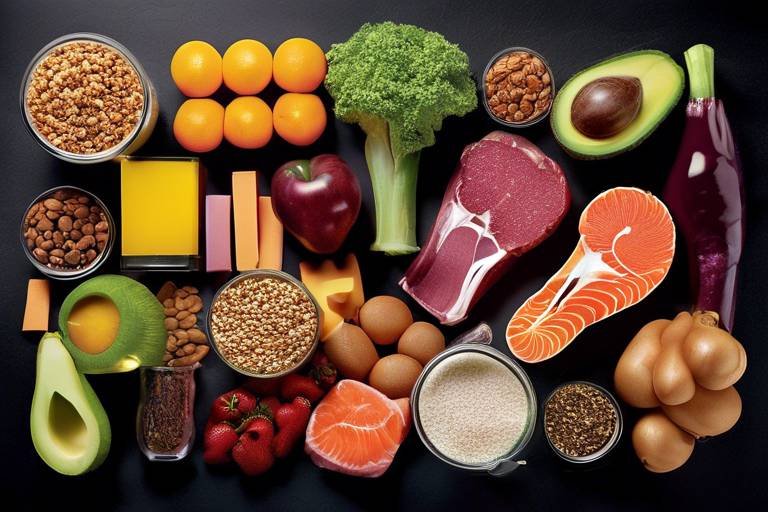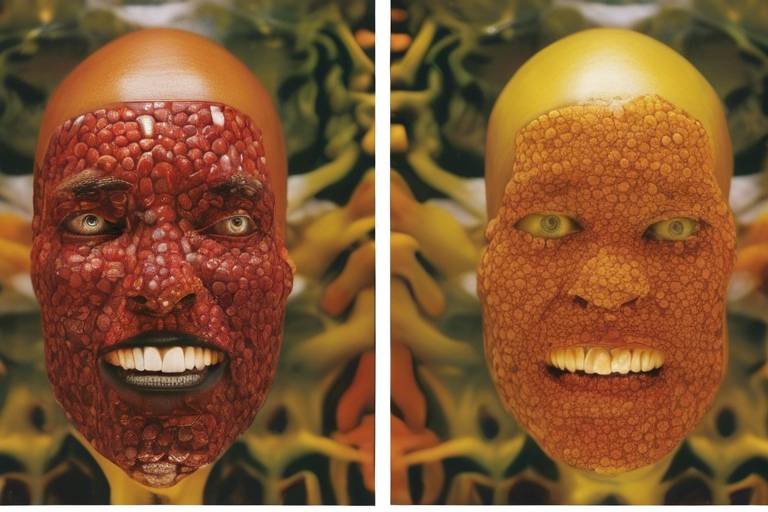The Biology of Nutrition - How It Fuels Our Bodies
Have you ever wondered how the food you eat transforms into the energy that powers your daily activities? The intricate relationship between nutrition and biology is a fascinating journey that begins with the very first bite of food. Nutrition is not just about filling our stomachs; it’s a complex process that fuels our bodies, supports our health, and influences our overall well-being. Think of your body as a high-performance engine; it requires the right fuel to run efficiently. In this article, we will delve into how various nutrients impact bodily functions, the importance of a balanced diet, and how our nutritional needs evolve throughout our lives.
At the core of nutrition are macronutrients and micronutrients, each playing unique roles in maintaining our health. Macronutrients—carbohydrates, proteins, and fats—are the primary sources of energy. They are like the building blocks of your diet, providing the raw materials your body needs to function optimally. On the other hand, micronutrients, which include vitamins and minerals, are equally essential but required in smaller amounts. They act as catalysts in various biochemical reactions, ensuring that your body operates smoothly. Understanding the roles of these nutrients helps us make informed dietary choices that can enhance our energy levels and overall health.
Moreover, the digestive process is another critical aspect of nutrition that we must consider. It’s not enough to eat healthy foods; how our bodies break down and absorb these nutrients is equally important. From the moment food enters our mouths, a fascinating series of events unfolds. Enzymes break down complex food particles into simpler, absorbable forms. This process is crucial for ensuring that our bodies can utilize the nutrients we consume effectively. A healthy gut microbiome also plays a vital role in nutrient absorption, acting as a supportive community that enhances our digestive capabilities.
As we journey through life, our nutritional needs change dramatically. For instance, the dietary requirements of a growing child differ vastly from those of an elderly person. In childhood, proper nutrition is essential for growth and development, as it lays the foundation for a healthy future. Key nutrients like calcium, iron, and vitamins are crucial during these formative years. Conversely, as we age, our bodies require different nutrients to combat age-related issues. Tailoring our diets to meet these evolving needs is essential for maintaining health and vitality throughout our lives.
In summary, nutrition is a fundamental aspect of biology that fuels our bodies and impacts our health. By understanding the roles of various nutrients, the digestive process, and the changing nutritional needs across the lifespan, we can make informed choices that support our well-being. Remember, your body is a remarkable machine, and it deserves the best fuel to keep it running smoothly!
- What are macronutrients and why are they important?
Macronutrients are nutrients required in large amounts, including carbohydrates, proteins, and fats. They provide the energy necessary for daily activities and bodily functions.
- How do micronutrients affect my health?
Micronutrients, such as vitamins and minerals, are essential for various biochemical processes in the body. Deficiencies can lead to health issues, making it crucial to include them in your diet.
- What role does digestion play in nutrition?
Digestion breaks down food into absorbable nutrients, allowing the body to utilize them effectively. A healthy digestive system is key to optimizing nutrition.
- How do nutritional needs change with age?
Nutritional requirements evolve from childhood to old age. Children need nutrients for growth, while seniors may require specific nutrients to maintain health and prevent age-related issues.

The Role of Macronutrients
Macronutrients are the cornerstone of our diet, providing the energy and building blocks necessary for our bodies to function optimally. These nutrients, which include carbohydrates, proteins, and fats, play distinct yet interconnected roles in our overall health. Understanding how each macronutrient contributes to our bodily functions can empower us to make informed dietary choices that enhance our well-being.
Carbohydrates are often misunderstood, sometimes seen as the enemy in weight loss journeys. However, they are the body's primary source of energy. When we consume carbohydrates, our bodies break them down into glucose, which fuels our cells, tissues, and organs. Think of carbohydrates as the gasoline that keeps our engines running. Without them, we might feel sluggish and fatigued. It's essential to choose complex carbohydrates, such as whole grains, fruits, and vegetables, over simple sugars, as they provide sustained energy and essential nutrients.
Proteins, on the other hand, are the body's building blocks. They are crucial for repairing tissues, making enzymes and hormones, and supporting immune function. When we eat protein, our bodies break it down into amino acids, which are then used to build and repair muscles, skin, and organs. Imagine proteins as the construction workers of our bodies, tirelessly repairing and maintaining our physical structure. It's vital to include a variety of protein sources in our diets, such as lean meats, dairy, legumes, and nuts, to ensure we get all the essential amino acids our bodies need.
Lastly, we have fats, which are often demonized in popular culture, yet they are essential for our health. Fats provide a concentrated source of energy, support cell growth, and help our bodies absorb certain vitamins. They also play a crucial role in brain health and hormone production. Think of fats as the cushion that protects our organs and keeps our bodies functioning smoothly. It's important to focus on healthy fats, such as those found in avocados, olive oil, and fatty fish, while minimizing trans fats and excessive saturated fats.
To summarize, each macronutrient serves a unique purpose in our diets:
- Carbohydrates: Primary energy source, especially for high-intensity activities.
- Proteins: Essential for growth, repair, and maintenance of body tissues.
- Fats: Important for energy, cell structure, and nutrient absorption.
Balancing these macronutrients is key to a healthy diet. Each person’s needs may vary based on factors like age, activity level, and health goals. Therefore, understanding the role of macronutrients can help us tailor our diets to meet our individual needs and promote optimal health.
- What is the ideal macronutrient ratio for a balanced diet? While it varies, a common recommendation is 45-65% carbohydrates, 10-35% protein, and 20-35% fats.
- Can I lose weight by cutting out carbohydrates? While reducing carbs can lead to weight loss, it's essential to choose healthy carbohydrates for overall health.
- Are all fats bad for you? No, healthy fats from sources like avocados and nuts are beneficial, while trans fats should be avoided.

The Importance of Micronutrients
When we think about nutrition, we often focus on macronutrients like proteins, fats, and carbohydrates. However, micronutrients—which include vitamins and minerals—are just as crucial, albeit in smaller amounts. These tiny powerhouses play a monumental role in maintaining our overall health and ensuring that our bodies function optimally. Without the right balance of micronutrients, our bodies can struggle to perform even the most basic tasks, leading to a cascade of health issues.
Micronutrients are essential for various bodily functions, such as immune response, bone health, and energy production. For instance, vitamin D is vital for calcium absorption, which is necessary for strong bones. On the other hand, vitamin C is not just a cold-fighter; it also plays a key role in collagen production, which is crucial for skin health. The body requires these nutrients in minute quantities, but their impact is anything but small. A deficiency in any of these can lead to serious health problems, including weakened immunity, delayed wound healing, and even chronic diseases.
Let’s break it down a bit more. Here’s a quick overview of some critical micronutrients and their roles:
| Micronutrient | Function | Food Sources |
|---|---|---|
| Vitamin A | Essential for vision and immune function | Carrots, sweet potatoes, spinach |
| Vitamin C | Antioxidant, aids in collagen formation | Citrus fruits, strawberries, bell peppers |
| Iron | Crucial for oxygen transport in the blood | Red meat, beans, lentils |
| Calcium | Important for bone health and muscle function | Dairy products, leafy greens, fortified foods |
As you can see, each micronutrient has its own unique contribution to our health. But what happens if we don’t get enough of these essential nutrients? The consequences can be dire. For example, a lack of vitamin D can lead to brittle bones, while insufficient iron can result in anemia, causing fatigue and weakness. The body is incredibly resilient, but it can only compensate for so long before deficiencies manifest in noticeable ways.
Incorporating a variety of foods into your diet is key to ensuring you get a wide range of micronutrients. Think of your plate as a palette; the more colors you include, the more nutrients you’re likely to consume. Fruits, vegetables, whole grains, lean proteins, and healthy fats should all find a place in your daily meals. Not only does this approach enhance your nutritional intake, but it also keeps your meals exciting and flavorful!
To wrap it up, micronutrients may be small, but their impact on our health is monumental. They are the unsung heroes of nutrition, quietly supporting our bodies in a myriad of ways. By understanding their importance and making conscious dietary choices, we can ensure that we’re fueling our bodies with everything they need to thrive. Remember, a balanced diet is not just about avoiding deficiencies; it’s about empowering your body to reach its full potential!
- What are micronutrients? Micronutrients are vitamins and minerals needed in small amounts for various bodily functions.
- Why are micronutrients important? They support critical processes such as immune function, energy production, and bone health.
- Can I get enough micronutrients from my diet? Yes, a varied diet rich in fruits, vegetables, whole grains, and lean proteins can provide adequate micronutrients.
- What happens if I have a micronutrient deficiency? Deficiencies can lead to health issues such as weakened immunity, fatigue, and chronic diseases.

Vitamins: Essential for Life
Vitamins are like the unsung heroes of our diet, playing a crucial role in maintaining our health and supporting various biochemical functions in our bodies. These organic compounds are essential for processes such as energy production, immune function, and even the maintenance of our skin and vision. Without them, our bodies would struggle to perform optimally, akin to a car running on empty. So, let's dive into the different types of vitamins, their sources, and the specific health benefits they bring to the table.
Vitamins can be categorized into two main groups: water-soluble and fat-soluble. Each group has unique characteristics and functions that are vital for our health.
Water-soluble vitamins, such as the B vitamins and vitamin C, dissolve in water and are not stored in the body. This means we need to consume them regularly to maintain adequate levels. These vitamins play significant roles in energy metabolism and are crucial for the immune system. For instance, vitamin C is well-known for its antioxidant properties and its ability to enhance iron absorption, while B vitamins help convert food into energy.
Some excellent dietary sources of water-soluble vitamins include:
- Vitamin C: Found in citrus fruits, strawberries, bell peppers, and broccoli.
- B Vitamins: Available in whole grains, meat, eggs, and leafy greens.
On the other hand, fat-soluble vitamins, like vitamins A, D, E, and K, are stored in the body’s fatty tissues and liver. They are absorbed along with dietary fat, making it essential to include healthy fats in our diet for optimal absorption. These vitamins play diverse roles: for example, vitamin A is essential for vision and immune function, while vitamin D is vital for bone health and calcium absorption.
Here’s a quick look at some food sources rich in fat-soluble vitamins:
| Vitamin | Sources |
|---|---|
| Vitamin A | Carrots, sweet potatoes, spinach, and liver. |
| Vitamin D | Fatty fish, fortified milk, and sunlight exposure. |
| Vitamin E | Nuts, seeds, and green leafy vegetables. |
| Vitamin K | Green leafy vegetables, broccoli, and Brussels sprouts. |
In conclusion, vitamins are indeed essential for life, acting as the building blocks for a healthy body. They support a myriad of functions that keep us thriving, from boosting our immune system to ensuring our metabolism runs smoothly. Incorporating a variety of foods rich in these vital nutrients into our diet is key to maintaining our health and well-being.
Q: What happens if I don't get enough vitamins?
A: A deficiency in vitamins can lead to various health issues, including weakened immunity, poor vision, and fatigue, among others. It's crucial to have a balanced diet to ensure you meet your vitamin needs.
Q: Can I get all my vitamins from food alone?
A: Yes, a well-rounded diet filled with fruits, vegetables, whole grains, and healthy fats can provide you with all the necessary vitamins. However, some individuals may require supplements based on their specific health needs.
Q: Are there any risks associated with taking vitamin supplements?
A: While vitamins are essential, taking them in excessive amounts, especially fat-soluble vitamins, can lead to toxicity. It's best to consult with a healthcare provider before starting any supplementation.

Water-Soluble Vitamins
Water-soluble vitamins are a group of essential nutrients that play a crucial role in maintaining our health. Unlike fat-soluble vitamins, which can be stored in the body, water-soluble vitamins are not retained and must be replenished regularly through our diet. The two most notable categories of water-soluble vitamins are the B vitamins and vitamin C. These vitamins are vital for various biochemical processes that keep our bodies functioning smoothly.
Let's take a closer look at the B vitamins. This group includes several vitamins, each with unique functions:
- Vitamin B1 (Thiamine): Important for energy metabolism and nerve function.
- Vitamin B2 (Riboflavin): Supports energy production and skin health.
- Vitamin B3 (Niacin): Crucial for DNA repair and production of stress hormones.
- Vitamin B5 (Pantothenic Acid): Essential for fatty acid synthesis and energy production.
- Vitamin B6 (Pyridoxine): Aids in protein metabolism and cognitive development.
- Vitamin B7 (Biotin): Necessary for carbohydrate and fat metabolism.
- Vitamin B9 (Folate): Important for DNA synthesis and cell division, especially during pregnancy.
- Vitamin B12 (Cobalamin): Essential for red blood cell formation and neurological function.
Vitamin C, also known as ascorbic acid, is another key player in the realm of water-soluble vitamins. It is renowned for its antioxidant properties, helping to protect our cells from damage caused by free radicals. Additionally, vitamin C is vital for the synthesis of collagen, a protein that supports skin, blood vessels, and bones. A deficiency in vitamin C can lead to scurvy, characterized by symptoms such as fatigue, gum disease, and skin issues.
Because water-soluble vitamins dissolve in water, they are easily lost during cooking or food processing. To maximize their intake, it’s advisable to consume fruits and vegetables raw or lightly cooked. Here’s a quick reference table showing some common food sources of these essential vitamins:
| Vitamin | Food Sources |
|---|---|
| Vitamin B1 | Whole grains, pork, and legumes |
| Vitamin B2 | Dairy products, eggs, green leafy vegetables |
| Vitamin B3 | Poultry, fish, whole grains |
| Vitamin B6 | Fish, beef liver, potatoes, and non-citrus fruits |
| Vitamin B12 | Meat, fish, dairy products |
| Vitamin C | Citrus fruits, strawberries, bell peppers, and broccoli |
Incorporating a variety of these foods into your daily diet can help ensure you get enough of these vital nutrients. Remember, a balanced diet rich in fruits, vegetables, and whole grains is the best way to support your body’s needs. So, next time you sit down for a meal, think about those water-soluble vitamins and how they are working hard to keep you healthy!
Q: What happens if I don't get enough water-soluble vitamins?
A: A deficiency in water-soluble vitamins can lead to various health issues, including fatigue, weakened immune function, and skin problems. It's essential to consume adequate amounts through your diet.
Q: Can I get enough water-soluble vitamins from supplements?
A: While supplements can help, it's best to obtain vitamins from whole foods, which provide additional nutrients and health benefits.
Q: How can I preserve water-soluble vitamins in my food?
A: To preserve these vitamins, try steaming or microwaving vegetables instead of boiling them, and consume fruits and vegetables raw whenever possible.

Fat-Soluble Vitamins
Fat-soluble vitamins are a group of essential nutrients that our bodies rely on for a variety of critical functions. Unlike their water-soluble counterparts, these vitamins are stored in the body's fatty tissues and liver, which means they can be utilized over time, making them particularly important for maintaining overall health. The four primary fat-soluble vitamins are vitamin A, vitamin D, vitamin E, and vitamin K. Each of these vitamins plays a unique role in our physiology, and understanding their functions can help us make informed dietary choices.
Vitamin A is crucial for maintaining healthy vision, supporting immune function, and promoting skin health. It can be found in foods like carrots, sweet potatoes, and spinach, where it exists in the form of beta-carotene, a precursor that our bodies convert into active vitamin A. On the other hand, vitamin D is often referred to as the "sunshine vitamin" because our bodies can synthesize it when exposed to sunlight. This vitamin is vital for calcium absorption, bone health, and immune system support. Dietary sources include fatty fish, fortified dairy products, and egg yolks.
Vitamin E acts as a powerful antioxidant, protecting our cells from oxidative stress and damage. This vitamin is abundant in nuts, seeds, and vegetable oils, making it relatively easy to incorporate into a balanced diet. Lastly, vitamin K is essential for blood clotting and bone health. It can be found in green leafy vegetables like kale and broccoli, as well as in fermented foods. Each of these vitamins not only supports specific bodily functions but also works synergistically with one another to promote optimal health.
It's important to note that while fat-soluble vitamins are essential, they can accumulate in the body and potentially lead to toxicity if consumed in excessive amounts. This is why it’s crucial to adhere to recommended dietary allowances (RDAs) and consult with healthcare professionals when considering supplementation. In a balanced diet, these vitamins are best absorbed when consumed with healthy fats, such as avocados, olive oil, or nuts, which enhance their bioavailability and effectiveness.
In summary, fat-soluble vitamins are indispensable for maintaining various bodily functions, and incorporating a variety of food sources into your diet is key to ensuring you receive adequate amounts. By understanding the unique roles of these vitamins, we can better appreciate their importance in our overall nutrition.
- What are fat-soluble vitamins? Fat-soluble vitamins are vitamins that dissolve in fats and oils, allowing them to be stored in the body's fatty tissues and liver.
- What are the main fat-soluble vitamins? The four main fat-soluble vitamins are vitamins A, D, E, and K.
- How can I ensure I get enough fat-soluble vitamins? To ensure adequate intake, consume a balanced diet rich in fruits, vegetables, nuts, seeds, and healthy fats.
- Can I get too much fat-soluble vitamins? Yes, excessive intake of fat-soluble vitamins can lead to toxicity, so it’s important to follow recommended dietary allowances.

Minerals: Building Blocks of Health
Minerals are often overlooked in our daily diets, yet they are essential components that play a pivotal role in maintaining our overall health. These inorganic elements are not just mere additives; they are the foundation upon which our bodies build and sustain various physiological functions. From the formation of bones and teeth to the regulation of heart rhythms and muscle contractions, minerals are involved in almost every aspect of our bodily functions. Imagine your body as a complex machine; minerals are the nuts and bolts that keep everything running smoothly.
There are two main categories of minerals: macrominerals and trace minerals. Macrominerals, such as calcium, magnesium, and potassium, are required in larger amounts, while trace minerals, like iron, zinc, and selenium, are needed in smaller quantities but are equally vital. Each mineral has its unique role and function, contributing to a well-balanced diet. For instance, calcium is crucial for bone health, while iron is essential for oxygen transport in the blood.
To further illustrate the importance of these minerals, let’s take a closer look at some key minerals and their health benefits:
| Mineral | Function | Food Sources |
|---|---|---|
| Calcium | Bone health, muscle function | Dairy products, leafy greens, fortified foods |
| Iron | Oxygen transport, energy production | Red meat, beans, lentils, spinach |
| Magnesium | Muscle and nerve function, energy production | Nuts, seeds, whole grains, green leafy vegetables |
| Zinc | Immune function, wound healing | Meat, shellfish, legumes, seeds |
Deficiencies in these minerals can lead to serious health issues. For example, a lack of calcium can result in weakened bones, increasing the risk of fractures and osteoporosis. Similarly, insufficient iron intake can lead to anemia, characterized by fatigue and weakness. Therefore, it is crucial to ensure that our diets are rich in these essential minerals.
In conclusion, minerals are the unsung heroes of our diets. They are the building blocks of health that support a myriad of bodily functions. By incorporating a variety of mineral-rich foods into our meals, we can help our bodies thrive and maintain optimal health. So, the next time you sit down for a meal, think about those tiny yet mighty minerals and the significant impact they have on your well-being!
- What are the best sources of minerals?
Minerals can be found in a variety of foods, including fruits, vegetables, nuts, seeds, dairy products, and meats. A balanced diet that includes a wide range of these foods can help ensure adequate mineral intake.
- How can I tell if I'm deficient in minerals?
Symptoms of mineral deficiencies can vary widely depending on the mineral. Common signs include fatigue, weakness, bone pain, and muscle cramps. If you suspect a deficiency, it's best to consult with a healthcare professional.
- Can I get enough minerals from supplements?
While supplements can help fill nutritional gaps, it's generally best to obtain minerals from whole foods. Supplements should not replace a healthy diet but can be useful in certain situations, especially for individuals with specific dietary restrictions.

The Digestive Process
The digestive process is a fascinating journey that our food takes from the moment we take a bite to when our bodies absorb the essential nutrients. Imagine your body as a highly efficient factory, where every part plays a critical role in transforming raw materials (food) into energy and building blocks necessary for life. This intricate process involves several organs and a series of biochemical reactions that work together seamlessly. When we eat, the journey begins in the mouth, where mechanical chewing and saliva start breaking down food into smaller pieces, making it easier for our bodies to extract nutrients.
Once the food is swallowed, it travels down the esophagus and enters the stomach, a muscular organ that churns the food and mixes it with gastric juices. These juices contain hydrochloric acid and digestive enzymes that further break down proteins and kill harmful bacteria. It’s like a powerful blender, turning solid food into a soupy mixture known as chyme. This mixture then gradually moves into the small intestine, where the real magic happens. Here, the chyme is mixed with bile from the liver and pancreatic juices, which contain enzymes that digest carbohydrates, proteins, and fats.
The small intestine is the star of the show when it comes to nutrient absorption. It has tiny finger-like projections called villi and microvilli that increase the surface area, allowing for maximum absorption of nutrients into the bloodstream. This is where the body takes what it needs from the food we eat, sending vitamins, minerals, and other essential nutrients into our cells. It’s almost like a sponge soaking up water! The remaining undigested food then moves into the large intestine, where water is absorbed, and waste is prepared for elimination.
Understanding this process is crucial for optimizing nutrition. If any part of this intricate system is disrupted, it can lead to malabsorption of nutrients, digestive issues, and a host of health problems. Therefore, maintaining a healthy digestive system is essential for overall well-being. This includes eating a balanced diet rich in fiber, staying hydrated, and being mindful of our food choices. After all, our bodies are like finely tuned machines, and we need to fuel them properly to keep everything running smoothly.
Digestive enzymes are the unsung heroes of the digestive process. These specialized proteins are produced by the salivary glands, stomach, pancreas, and small intestine, and they play a critical role in breaking down food into absorbable nutrients. Without these enzymes, our bodies would struggle to extract the energy and nutrients we need to thrive. For instance, amylase breaks down carbohydrates, proteases tackle proteins, and lipases handle fats. Imagine them as tiny workers in a factory, each with a specific job to ensure that everything runs efficiently.
A healthy gut microbiome is essential for effective nutrient absorption. Our intestines are home to trillions of bacteria that help break down food, synthesize vitamins, and protect against harmful pathogens. This complex ecosystem can be influenced by our diet, lifestyle, and even stress levels. A diet rich in fiber, prebiotics, and probiotics can promote a healthy gut microbiome, ensuring that our bodies can absorb nutrients effectively. Think of it as a garden; if we nurture it with the right ingredients, it will flourish and provide us with the health benefits we need.
- What are the main functions of the digestive system? The digestive system breaks down food, absorbs nutrients, and eliminates waste.
- How can I improve my digestive health? Eating a balanced diet, staying hydrated, and including fiber-rich foods can help improve digestive health.
- What role do enzymes play in digestion? Enzymes are crucial for breaking down food into smaller, absorbable nutrients.
- Why is gut health important? A healthy gut microbiome aids in nutrient absorption and protects against harmful bacteria.

The Role of Enzymes
Enzymes are the unsung heroes of our digestive system, playing a crucial role in breaking down the food we eat into the nutrients our bodies need. Imagine enzymes as tiny workers in a factory, each with its own specific job to do. They help transform complex food molecules into simpler forms that our bodies can easily absorb and utilize. Without these remarkable proteins, our digestive process would be like trying to build a house without the right tools—impossible!
When we consume food, it enters our digestive tract and encounters a variety of enzymes that facilitate the breakdown of carbohydrates, proteins, and fats. For instance, amylase starts breaking down starches into sugars in our saliva, while pepsin begins the protein digestion process in the stomach. Each enzyme is tailored to work on a specific type of nutrient, ensuring that our bodies can efficiently utilize what we consume.
To give you a clearer picture, here’s a quick overview of some essential digestive enzymes and their functions:
| Enzyme | Function | Location of Action |
|---|---|---|
| Amylase | Breaks down carbohydrates into sugars | Mouth and small intestine |
| Pepsin | Breaks down proteins into peptides | Stomach |
| Lipase | Breaks down fats into fatty acids and glycerol | Small intestine |
But wait, there's more! Enzymes don't just help with digestion; they also play a vital role in nutrient absorption. Once food is broken down into its simplest forms, enzymes facilitate the transfer of these nutrients through the intestinal walls and into the bloodstream. This process is essential because it allows our bodies to receive the vitamins, minerals, and energy we need to function optimally.
However, several factors can affect enzyme activity, including pH levels, temperature, and the presence of certain inhibitors. For example, a high-fat meal might slow down the digestive process, leading to a backlog of food in the stomach. This can result in discomfort and even nutrient malabsorption. Therefore, maintaining a balanced diet that supports healthy enzyme function is essential for optimal digestion.
In conclusion, enzymes are indispensable for our digestive health, acting as catalysts that make the breakdown and absorption of nutrients possible. By understanding their role, we can appreciate the complexity of our digestive system and the importance of maintaining a balanced diet to support these tiny but mighty workers.
- What are enzymes? Enzymes are proteins that speed up chemical reactions in the body, including those necessary for digestion.
- How do enzymes aid digestion? They break down food into smaller, absorbable components, making it easier for the body to utilize nutrients.
- Can enzyme activity be affected by diet? Yes, certain foods can enhance or inhibit enzyme activity, impacting digestion and nutrient absorption.
- Are there supplements for digestive enzymes? Yes, enzyme supplements are available and can be beneficial for individuals with specific digestive issues.

Gut Health and Nutrient Absorption
Have you ever wondered why your gut is often referred to as your "second brain"? This fascinating relationship between gut health and nutrient absorption is more significant than you might think. Our digestive system is not just a passageway for food; it's a complex ecosystem that plays a crucial role in how well our bodies utilize the nutrients we consume. When we talk about gut health, we're primarily referring to the balance of microorganisms living in our intestines, which is known as the gut microbiome. This diverse community of bacteria, fungi, and other microbes is essential for breaking down food, synthesizing vitamins, and even influencing our immune system.
When the gut microbiome is in balance, it helps enhance nutrient absorption. Nutrients like carbohydrates, proteins, and fats are broken down into their simplest forms—sugars, amino acids, and fatty acids—so that our bodies can easily absorb them. However, an imbalance in gut health can lead to a range of issues, including malabsorption, inflammation, and even chronic diseases. For instance, if the beneficial bacteria are outnumbered by harmful ones, it can lead to conditions like leaky gut syndrome, where the intestinal lining becomes permeable, allowing toxins and undigested food particles to enter the bloodstream. This can trigger inflammatory responses and nutrient deficiencies.
To illustrate the importance of gut health, consider the following table that highlights key nutrients and their absorption processes:
| Nutrient | Absorption Site | Key Microbes Involved |
|---|---|---|
| Carbohydrates | Small intestine | Bacteroides, Firmicutes |
| Proteins | Small intestine | Lactobacillus, Bifidobacterium |
| Fats | Small intestine | Faecalibacterium, Roseburia |
| Vitamins | Small intestine | Various (depends on vitamin type) |
Maintaining a healthy gut microbiome can be achieved through a balanced diet rich in fiber, probiotics, and prebiotics. Foods like yogurt, kefir, sauerkraut, and high-fiber fruits and vegetables can promote the growth of beneficial bacteria. On the other hand, a diet high in sugar and processed foods can lead to an imbalance, making it essential to choose wisely. Regular physical activity and staying hydrated also contribute to a thriving gut environment.
In conclusion, the health of our gut is intricately linked to how well we absorb nutrients. By nurturing our gut microbiome, we can optimize our nutrient intake and, in turn, support our overall health. So the next time you think about what to eat, remember that your gut is not just digesting food; it's also playing a vital role in fueling your body.
- What are probiotics, and why are they important? Probiotics are live bacteria found in certain foods that can provide health benefits by improving or restoring the gut flora.
- How can I improve my gut health? Eating a balanced diet rich in fiber, fermented foods, and staying hydrated can significantly improve gut health.
- What are the signs of an unhealthy gut? Symptoms can include bloating, gas, diarrhea, constipation, and food intolerances.
- Can stress affect gut health? Yes, stress can disrupt the balance of bacteria in your gut and lead to digestive issues.

Nutritional Needs Across the Lifespan
Nutritional requirements are not static; they evolve as we journey through different stages of life. From the moment we are born to our twilight years, our bodies demand different nutrients to support growth, development, and overall health. Understanding these changing needs is essential for fostering a healthy lifestyle and preventing nutritional deficiencies. For instance, infants require a diet rich in fats and proteins to support rapid brain development, while older adults may need to focus more on calcium and vitamin D to maintain bone health.
During childhood, the body is in a constant state of growth, and thus, children need a balanced intake of macronutrients and micronutrients. Key nutrients such as iron, calcium, and vitamins A and C are crucial for developing strong bones and a robust immune system. Parents should aim for a diet that includes a variety of foods, such as:
- Fruits and Vegetables: Rich in vitamins and minerals.
- Whole Grains: Essential for energy and fiber.
- Lean Proteins: Important for growth and muscle development.
- Dairy Products: Vital for calcium and vitamin D.
As we transition into adolescence, the nutritional focus shifts slightly. Teenagers experience growth spurts and hormonal changes, making it crucial to consume adequate calories and nutrients. They require increased amounts of iron (especially for girls) and calcium to support bone density, as well as protein for muscle development. It’s a time when many young people develop their eating habits, so fostering a positive relationship with food is essential.
When we reach adulthood, our nutritional needs stabilize, but they still vary based on lifestyle, activity level, and health status. For instance, athletes may require more carbohydrates and protein to fuel their workouts, while those who are sedentary might not need as many calories. Additionally, women of childbearing age should prioritize nutrients like folic acid to support reproductive health.
As we enter our senior years, the focus shifts again. Older adults often face challenges such as decreased metabolism, changes in appetite, and potential health issues that require special dietary considerations. Nutritional needs may include:
- Increased Protein: To help maintain muscle mass.
- Fiber: To support digestive health.
- Hydration: Older adults may not feel thirsty, so regular fluid intake is crucial.
- Vitamin B12: Important for nerve function and blood formation.
Moreover, seniors should focus on nutrient-dense foods that provide maximum benefits without excess calories. Foods rich in antioxidants, such as berries and leafy greens, can help combat oxidative stress, which is linked to aging.
In summary, understanding the nutritional needs across the lifespan is crucial for maintaining health and preventing disease. Each life stage presents unique challenges and requirements, and adapting our diets accordingly can lead to a healthier, more vibrant life.
Q: What are the essential nutrients for children?
A: Key nutrients include proteins, carbohydrates, fats, vitamins (especially A and C), and minerals like calcium and iron.
Q: How can seniors ensure they are getting enough nutrients?
A: Seniors should focus on nutrient-dense foods, stay hydrated, and consider consulting a healthcare provider for tailored dietary advice.
Q: Why is nutrition important during adolescence?
A: Adolescence is a critical growth period, and proper nutrition supports physical development, hormonal changes, and overall well-being.

Nutrition in Childhood
Nutrition in childhood is not just about filling little tummies; it's about fueling growth, development, and the foundation for a healthy future. During these formative years, children experience rapid physical and cognitive growth, which means their bodies require a variety of nutrients to thrive. Think of a child's body as a high-performance vehicle; just like a car needs the right fuel to run smoothly, children need the right nutrition to reach their full potential.
During childhood, key nutrients play a pivotal role in supporting essential bodily functions. These include:
- Proteins: Essential for growth and repair of tissues.
- Carbohydrates: The primary energy source for active kids.
- Fats: Crucial for brain development and hormone production.
- Vitamins and Minerals: Vital for immune function, bone health, and overall well-being.
For example, calcium and vitamin D are critical for developing strong bones, while iron is essential for cognitive development. A lack of these nutrients can lead to serious health issues, such as stunted growth or developmental delays. Therefore, ensuring that children receive a balanced diet rich in fruits, vegetables, whole grains, lean proteins, and healthy fats is fundamental.
Moreover, establishing healthy eating habits early on can set the stage for a lifetime of good health. Children are like sponges—they absorb not only nutrients but also habits and preferences. Introducing a variety of foods and flavors can help them develop a taste for healthy options. This means involving them in meal planning and preparation, making it a fun and educational experience. Think of it as teaching them the ropes of nutrition, like giving them a map for their health journey.
Another important aspect of childhood nutrition is the timing and frequency of meals. Regular meals and snacks can help maintain energy levels and prevent mood swings that often accompany hunger. A well-structured meal schedule can also promote better digestion and nutrient absorption. Parents might consider a table like this for a balanced daily meal plan:
| Meal | Examples |
|---|---|
| Breakfast | Oatmeal with fruit, scrambled eggs, and whole-grain toast |
| Snack | Yogurt with honey and berries |
| Lunch | Turkey sandwich on whole grain, carrot sticks, and an apple |
| Snack | Hummus with cucumber slices |
| Dinner | Grilled chicken, quinoa, and steamed broccoli |
In conclusion, childhood nutrition is a multifaceted journey that requires attention, care, and creativity. By prioritizing a balanced diet and fostering healthy habits, we can help our children build a strong foundation for a vibrant and healthy life. After all, healthy kids are happy kids, and they are more likely to grow into healthy adults. So, let's make nutrition a fun adventure rather than a chore!
Q: What are the most important nutrients for children?
A: Key nutrients include proteins, carbohydrates, fats, vitamins, and minerals. Each plays a unique role in supporting growth and development.
Q: How can I encourage my child to eat healthy?
A: Involve them in meal planning and preparation, introduce a variety of foods, and make healthy eating fun and engaging.
Q: What should I do if my child is a picky eater?
A: Be patient and persistent. Offer new foods multiple times and model healthy eating habits yourself.

Nutrition for Seniors
As we gracefully age, our bodies undergo a myriad of changes that impact our nutritional needs. It’s not just about eating less; it’s about eating right. Seniors often face challenges such as reduced metabolism, changes in appetite, and an increased risk of chronic diseases, making it crucial to tailor diets to meet these evolving requirements. Have you ever thought about how your body feels different as you age? Well, it’s all connected to nutrition!
One of the key aspects of senior nutrition is ensuring an adequate intake of protein. Protein is vital for maintaining muscle mass, which naturally declines with age. This decline can lead to frailty and increased risk of falls. The recommended dietary allowance for protein increases as we age, so incorporating high-quality protein sources such as lean meats, fish, eggs, and legumes is essential. But it’s not just about quantity; the quality of protein matters too!
Another important nutrient is calcium, which supports bone health. Seniors are at a higher risk for osteoporosis, a condition that weakens bones and makes them more prone to fractures. To combat this, dairy products, leafy greens, and fortified foods should be included in daily meals. Did you know that vitamin D plays a crucial role in calcium absorption? That’s right! So, sun exposure and vitamin D-rich foods, like fatty fish and fortified cereals, should not be overlooked.
Moreover, hydration becomes increasingly important as we age. Many seniors experience a diminished sense of thirst, which can lead to dehydration. It’s vital to encourage regular fluid intake throughout the day, not just relying on thirst as a guide. Water, herbal teas, and soups can help keep hydration levels in check. To illustrate the importance of hydration, consider this: our bodies are made up of about 60% water, and every single cell relies on it to function properly!
In addition to these nutrients, fiber is another superhero in the senior diet. It aids digestion and helps prevent constipation, a common issue among older adults. Foods rich in fiber include whole grains, fruits, vegetables, and legumes. Incorporating these foods can promote a healthy digestive system and improve overall well-being. Just imagine your gut as a garden; the more you nourish it with fiber, the more it flourishes!
Lastly, let’s not forget about the importance of variety. A colorful plate not only makes meals more appealing but also ensures a range of nutrients. Seniors should aim to include a variety of fruits, vegetables, grains, and proteins in their diets to cover all bases. Eating a rainbow of foods can be both fun and beneficial for health!
- What are the best sources of protein for seniors? Lean meats, fish, eggs, dairy products, beans, and legumes are all excellent sources.
- How can seniors ensure they are getting enough calcium? Incorporate dairy products, leafy greens, and fortified foods into your diet, and consider vitamin D supplements if necessary.
- What are some tips for staying hydrated? Drink water regularly throughout the day, consume soups, and opt for hydrating fruits like watermelon and cucumbers.
- Why is fiber important for seniors? Fiber aids digestion, prevents constipation, and contributes to overall gut health.
Frequently Asked Questions
- What are macronutrients and why are they important?
Macronutrients are the nutrients our bodies need in larger amounts to function properly. They include carbohydrates, proteins, and fats. Each plays a unique role: carbohydrates provide energy, proteins support growth and repair, and fats help with nutrient absorption. Understanding these can help you make better dietary choices that fuel your body effectively.
- How do micronutrients affect my health?
Micronutrients, such as vitamins and minerals, are essential for numerous bodily functions. They support everything from immune health to energy production. Deficiencies in these nutrients can lead to serious health issues, so it’s crucial to include a variety of foods in your diet to ensure you’re getting enough of them.
- What are the differences between water-soluble and fat-soluble vitamins?
Water-soluble vitamins, like B vitamins and vitamin C, dissolve in water and are not stored in the body, which means we need to consume them regularly. Fat-soluble vitamins, such as A, D, E, and K, are stored in body fat and can be accessed when needed. Each type plays unique roles in maintaining health, so a balanced diet is key!
- Why is gut health important for nutrient absorption?
A healthy gut microbiome is crucial for breaking down food and absorbing nutrients effectively. When your gut is healthy, it can efficiently process what you eat, ensuring your body gets the vitamins and minerals it needs. Poor gut health can lead to malabsorption and various health issues, so it’s essential to maintain a balanced diet rich in fiber and probiotics.
- How do nutritional needs change as we age?
Nutritional requirements evolve from infancy through old age. For instance, children need more calories and specific nutrients for growth, while seniors may require fewer calories but more nutrients to maintain health. Tailoring your diet to meet these changing needs is vital for overall well-being throughout life.
- What nutrients are essential for children?
During childhood, key nutrients include proteins for growth, calcium for strong bones, and vitamins for overall development. Foods like dairy, lean meats, fruits, and vegetables are excellent sources. Ensuring children receive a balanced diet during these formative years sets the foundation for a healthy future.
- What dietary considerations should seniors keep in mind?
Seniors should focus on nutrient-dense foods that provide essential vitamins and minerals without excessive calories. It's also important to stay hydrated and consider dietary adjustments to maintain digestive health. Consulting with a healthcare provider can help create a tailored diet plan that addresses specific health concerns.



















